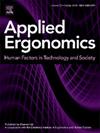Contributions of digital technologies for resilience capacity in a type 1 diabetes transition clinic: A qualitative study
IF 3.1
2区 工程技术
Q2 ENGINEERING, INDUSTRIAL
引用次数: 0
Abstract
A type 1 diabetes (T1D) transition clinic in Sydney, Australia, provides age specific care for young adults (aged 16–25 years) and for adults (aged 21 years and above), and has reported improved clinical outcomes post transition to adult care over a 21-year period. This study investigated the contribution of digital technology to long-term resilient capacity of the clinic. Clinic observations and interviews with eight providers and 17 young adults were conducted. Using a framework to analyze resilient capacity in healthcare, seven strong themes emerged from the data: Leadership, Involvement, Communication, Coordination, Risk Awareness, Competence and Alignment with three themes, Structure, Learning and Facilitators also supported. Patient service adaptations included offering out of hours appointment times and telehealth to accommodate young adults’ availability. This study provides evidence for the important role that digital technologies contribute to a system of care with capacity for resilience. Our findings contribute to the understanding of the factors needed to support young adults with T1D and may be valuable to inform models of care for young adults living with other chronic health conditions.
数字技术对 1 型糖尿病过渡诊所恢复能力的贡献:定性研究
澳大利亚悉尼的一家 1 型糖尿病(T1D)过渡诊所为年轻成人(16-25 岁)和成人(21 岁及以上)提供特定年龄段的医疗服务,并在 21 年间报告了过渡到成人医疗服务后临床疗效的改善情况。本研究调查了数字技术对该诊所长期恢复能力的贡献。研究人员对诊所进行了观察,并采访了 8 名医疗服务提供者和 17 名年轻人。通过使用分析医疗保健弹性能力的框架,从数据中发现了七大主题:领导力、参与、沟通、协调、风险意识、能力和一致性,以及结构、学习和促进者这三个主题也得到了支持。患者服务的调整包括提供非工作时间的预约时间和远程医疗服务,以适应年轻人的时间安排。这项研究证明了数字技术对具有恢复能力的医疗系统所起到的重要作用。我们的研究结果有助于人们了解支持患有 T1D 的年轻成人所需的因素,并可能对为患有其他慢性疾病的年轻成人提供护理模式有参考价值。
本文章由计算机程序翻译,如有差异,请以英文原文为准。
求助全文
约1分钟内获得全文
求助全文
来源期刊

Applied Ergonomics
工程技术-工程:工业
CiteScore
7.50
自引率
9.40%
发文量
248
审稿时长
53 days
期刊介绍:
Applied Ergonomics is aimed at ergonomists and all those interested in applying ergonomics/human factors in the design, planning and management of technical and social systems at work or leisure. Readership is truly international with subscribers in over 50 countries. Professionals for whom Applied Ergonomics is of interest include: ergonomists, designers, industrial engineers, health and safety specialists, systems engineers, design engineers, organizational psychologists, occupational health specialists and human-computer interaction specialists.
 求助内容:
求助内容: 应助结果提醒方式:
应助结果提醒方式:


